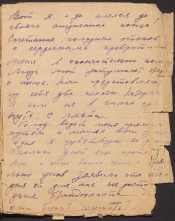
The Presidential Library reveals a story so well received by the author of Two Captains
As part of the campaign to preserve the memory of the everyday life of besieged Leningrad, announced last year, St. Petersburg resident Anna Chernyak addressed the Presidential Library. She brought to digitize the besieged diary of her father, Yuri Khazanov as well as an amazing letter by which it can be concluded that the famous writer, author of “Two Captains” Veniamin Kaverin also leafed through this diary and, perhaps, even used it when writing his books.
The siege diary of Yury Davydovich Khazanov (1915–1942) is one big insufferable pain: from hunger, from war, from life... Having received a disability associated with heart disease, even before World War II, he was not mobilized into the army and continued to get sick, being already in the besieged city.
“We stayed in Leningrad. Will I live, I do not know whether my heart will stand. Just in case, let's say goodbye, my darling, you did not live long with me, but you gave me many happy moments”, - he wrote, addressing his wife, who stayed with her daughter in another city.
“All these records will probably have to be destroyed. It's a pity! I would like someone to read, to see how hard it is to be a cripple. Anxiety interrupted me here”, - the record of 25 September says.
Here is the record of the terrible new 1942: “The New Year did not bring any relief. We live without food, light, heat and water, and in general are unlikely to survive... We wished each other happiness, wept out and went to bed at 8 o'clock, in order not to want eat anymore. On the 1st day a real famine came. People walk down the street almost dead. I am swollen like a deck, I have no strength to move”.
The last diary entries are dated by the beginning of February 1942: “So I reached the end of my life. The combination of hungry edema and heart swelling made me completely crippled. My brain is clouded by delirium about food. Hunger leads me straight to the grave, for four days now I have been feeling its breath”.
However, the last entry in the diary is one of the brightest: “My dream about Batumi is to take my mother to the south, to the warmth, the sea, fruits, vegetables, to a quiet and peaceful life. But this is not a myth, but quite real dream. I love my family, my wife, my mother, my sisters and I am ready to make any sacrifices for them. I want to live, I'm only 27 years old. I have the right to life!”
The further fate of the author of the diary is reflected in the letters, which in the early 1980s were handed to his daughter Anna by a childhood friend of Yuri Khazanov, Yakov Pyatov. Khazanov still lived to evacuate, he was taken from Leningrad in the direction of Gorky, but he died on the way...
“After the war, it so happened that once we met the writer Veniamin Kaverin, we went to the house on the way, - Yakov Pyatov wrote in a letter. - We talked, and he said that he wanted to write a book about the Leningrad siege, but he did not find decent materials. I let it slip that I had a diary of my best friend. He very much asked to give him a diary for the shortest time - for three days, assured me of the complete safety of the diary and that he would not show it to anyone. And I agreed. I thought, perhaps, to perpetuate the memory of such a beautiful person as the lost friend was. When I came to Kaverin after a diary three days later, he was very sorry for the unfulfilled promise - he could not resist and showed Yuri’s diary to my family, my wife. He said that he had never seen anything like it in the sincerity and purity of the human soul ... ”
There is a postscript at the end of the letter: “I don’t know how he used what he read in the diary. I read by no means everything written by V. Kaverin”.
Earlier as part of the campaign to collect evidence of the siege, the Presidential Library received information about the inventor who introduced innovations in porcelain production during the war, about young firefighters in besieged Leningrad, about the horrors of war through the eyes of artists, etc.
In total, about 200 people responded to the call of the Presidential Library to share testimonies about that time, the library was transferred and digitized over 900 archival records. With the participation of the Presidential Library in St. Petersburg, the Unified City Information Center which coordinates the coverage of events marking the 75th anniversary of the complete liberation of Leningrad from the Nazi siege, has been established.
The Presidential Library in conjunction with the St. Petersburg TV Channel, weekly produced the program “Siege Diary”. The institution's portal provides access to a virtual tour of the halls of the temporarily closed State Museum of Defence and Siege of Leningrad getting familiar with the electronic collection “Defence and Siege of Leningrad”, which includes official documents, periodicals, memoirs of Leningrad, food cards, photographs and newsreels.
Multimedia courage lessons for schoolchildren are arranged in the Presidential Library, including those based on the military writings of Daniil Granin, whose centenary is celebrated this year.









